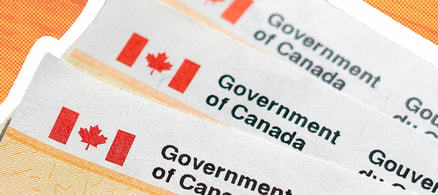So, you changed jobs a couple of months ago, and it’s going swimmingly. You’re learning new things, managing things like a boss, and coming home feeling accomplished after a great day. You’ve got this!
But suddenly, a bulky package arrives in your mailbox. It looks official and it’s postmarked from your old employer. You start scanning the documents, which are issuing an ultimatum: keep your pension with the company or transfer it.
When you take your money out of a pension, it goes into a Locked-in Retirement Account (or LIRA). A LIRA has a lot of the same rules as an RRSP but with some extras: 1) you can’t add to it; but you wouldn’t want to anyway because 2) these extra rules limit when you can withdraw and how much.
Some pensions offer a lump sum that has a cash payout beyond the LIRA. In these cases, you pay tax on the extra amount or have the option to put it into an RRSP if you have enough remaining RRSP room.
What to do with your company pension is a big decision – so big that it may affect you for, well, a lifetime. But wipe that sweat off your brow – you’ve got options. For starters, there’s no right or wrong answer – what you do with your company pension will largely depend on your circumstances. If you and your co-worker both got laid off at the same time, it’s entirely possible the right thing for you is to take the cash and the right thing for your co-worker is to keep the pension.
But before you pull the trigger, you must get solid financial advice to inform that decision – which is likely the hardest part of this decision. So let’s talk about the essential things to consider.
Risk
Start by thinking “Talk me out of it.” A pension is a pretty good deal. From the earliest retirement date, it is someone else’s problem to generate enough returns to pay your monthly income. It’s their risk, not yours. You don’t have to lose sleep when the market crashes; you just have to cash cheques. In some cases, you get to keep your work benefits as well. Those can be valuable. You’re going to need a good reason to take on this investing burden. One big mistake, (like panic-selling at the wrong time) could completely remove any benefit you gained by taking on the risk yourself.
Inflation
Unfortunately, it’s often not as simple as cashing cheques. We have to think about inflation. Retirement can last a long time and inflation can get really ugly. Someone who retired in 1990 with a pension of $5,000 per month would only have the spending power of $2,870 today. That’s more than a 42% loss in income! Some pensions adjust for this and some don’t. Pensions with a Cost of Living Adjustment can provide more benefits than their counterparts. If you don’t have a COLA on your pension, you likely need to plan for those later years in some ways.
If you’re a member of a pension with a COLA (Cost of Living Adjustment) and read all of the documents that you receive, you may have noticed that it can vary annually. Certain pension managers have even attempted to get away from their COLA commitments to plan members and want to only offer it when the pension can afford to. This is a broader issue of pension health. All pensions are required to provide annual reports that talk about their funding levels. It can be a good idea to review these reports and ask questions if possible. If you’re going to be tied to this pension for the remainder of your life, you’d like to have some confidence it will be there and meet its commitments.
It’s no surprise that the math doesn’t often decisively point in one direction either. A pension’s goal is going to be to pay everybody with as little investment risk as possible. That should be your goal, too: to have enough money to retire with as little risk as possible. So, when you work the math backwards, you’ll often find that you get an answer of taking a moderate amount of risk with the cash proceeds should (in theory) match your pension.
So all things considered: if I’m just trying to match my pension, but need to take some risk with the cash or zero-risk the pension, a reasonable person would just keep the pension. No risk is better than any risk. If your pension offers a COLA, then the bar would be higher in terms of the risk needed to match. An important thing to remember is that this math only works if you invest all of the cash you can. With Wealthsimple, we would suggest a disciplined, passive approach to investing with low costs.
Life expectancy
When working on the math, there’s a crucial input that we will never have. There’s a finite number of years that you’ll receive the pension for or need to withdraw from your investments, but we don’t know that number because it’s when you pass away. The average life expectancy is getting longer. If you have reason to believe you’d live a long life then the value of the pension should be larger to you. If you have reason to believe that you’d live a shorter life in retirement, you may get better use from the cash amount.
Beneficiaries
What about your family? Many pensions offer a benefit to a survivor, but often, they can only reap 50% of the pension after you die. Some even give you choices on how you’d like this benefit to work. You can accept a smaller monthly pension if you’d like your spouse to receive the full benefit for their lifetime after you pass.
With the cash option, your spouse can take over your investment accounts without any loss. What happens after your spouse passes can be a bit more complicated.
If you take the cash, then your heirs can receive what’s left after tax when the second spouse passes away. Pensions often don’t have any residual for heirs after an initial set of years. Sometimes you’ll see a feature with a guaranteed payment for 10 years, or a lump sum paid out, but if you live long enough it goes to zero. Pensions are not easily transferred to the next generation without significant forethought.
Life goals
You’ll need to think about your priorities. If you take the cash and invest aggressively, with lots of risks, you can possibly create an outcome that is better than your pension option. Are you the type of person that would spend the excess cash or save the amount in an RRSP? Maybe your retirement will thank you if you keep the pension, so you don’t spend the money before you retire. If you and your spouse expect to live long lives, the pension should look pretty good, but if you don’t see that happening, or leaving a larger legacy is a priority, then the cash choice might be right for you.
Last word
Still undecided or have a unique situation? Talk to a money expert at Wealthsimple and get the advice you need. Wealthsimple’s team of advisors has years of experience advising seasoned, high-net-worth investors — and folks just starting, too.
Jeff Nichols is a Portfolio Manager and CFP® Professional at Wealthsimple. He joined Wealthsimple in 2018 and has over 8 years of experience providing financial advice and investment management.





